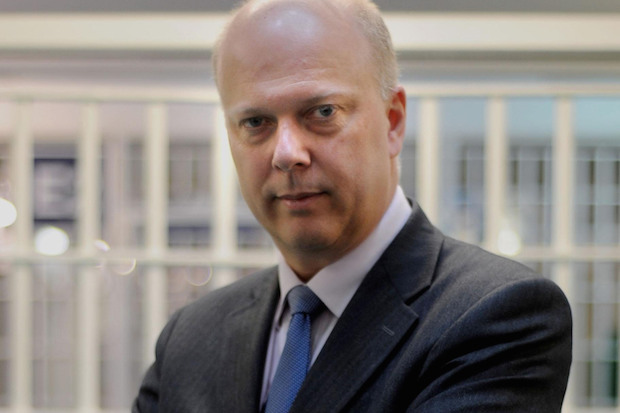When I was doing my time in HMP Standford Hill, a strange pair of heavily perfumed Korans and Bibles were delivered to one inmate, ostensibly to help him with his ‘studies in comparative religion’. As intended, the perfume threw the sniffer dogs off the scent. But a suspicious prison officer found a significant quantity of heroin stuck between the pages of these holy books. This was an example of ‘parcelling it,’ con-speak for getting drugs into jails.
So Chris Grayling, the Justice Secretary, has a point now that he is trying to restrict the supply of books into prisons. But not much of a point: such examples are real but rare. They have little to do with the current controversy, which was never designed to be either a crackdown on crack or an attack on prisoners’ rights to receive books. It is a limited effort to make life stricter on the inside and to look tougher from the outside. Much ado about nothing really, except that it has brought into play the cock-up theory of history – as always a more potent force than the conspiracy theory.
I will bet that no-one in government ever thought of the possibility that their minor changes to the regime could bring about a major backlash of protest about banning books for prisoners. Not for the first time officialdom has been outwitted by pressure groups. Will the media rumpus subside when the full story becomes understood? Or will it grow noisier, resurrecting the ‘nasty party’ image for the Conservatives? This may be a close call, a battle of facts versus perceptions.
The facts are mostly on the government’s side. There is no ban on books – prisoners are entitled to keep up to twelve volumes in their cells. They can take out any book from the prison library and order more from the National Library Service. This is an excellent arrangement. During my seven months inside, I ordered over 50 library books. Most arrived within three to four days.
Also easily available to prisoners are a wide range of educational courses (complete with books!); computer courses including full access to Google, and literacy courses such as those run by the Shannon Trust for the 20 per cent or more inmates who have reading difficulties. It is also easy to borrow improving books from the chapel or unimproving books from fellow prisoners, who often specialise in lending porn magazines! For high brows or low brows there is no shortage of reading material behind bars.
So why the fuss? Last October Chris Grayling introduced a revised incentives and privileges scheme into the system. This curtailed some television viewing, shortened the hours in which prisoners could wear their own clothes, and brought in other minor restrictions. This was pretty much a cosmetic exercise, a sop to right-wing critics who imagine that prisons are holiday camps. Most inmates barely noticed the changes, which is why no-one has complained much about them for over six months.
But one of the new restrictions is a ban on prisoners receiving parcels from outside. This was ostensibly a move to clamp down on books used to smuggle drugs, but is easily misrepresented. As a result of this self-inflicted wound, Mr Grayling now has a problem on his hands. He is taking on the massed lobbies of authors, writers, educators, prison reformers, social workers and all right thinking rehabilitationists who believe that books are a good influence on prisoners. These seasoned campaigners are unlikely to go quietly.
The irony of all this fuss is that Chris Grayling’s real motive in tightening the incentives and privileges scheme was to soften up his backbenchers in order to get an easy passage for his rehabilitation legislation. He wanted to look tough in order to deliver tenderness. By a country mile his Transforming Rehabilitation agenda is the most important reform for years in any government’s Criminal Justice Programme. Although it disgruntles the Probation Service, it offers the real prospect of bringing many more charities, mentoring organisations and management companies into the front line of rehabilitation. This privatisation could be a major breakthrough in the battle to reduce the depressingly high reoffending rates.
But just when this rehabilitation revolution is gathering momentum, a spoke has been thrust into its wheels by this cooked-up controversy over book parcels for prisoners. What a pointless distraction. Since Grayling is usually a supple rather than stubborn operator, I expect him to find a way of beating an elegant retreat for this skirmish.
Jonathan Aitken is a former Conservative cabinet minister






Comments